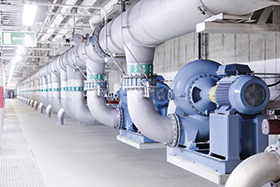

According to the International Energy Agency (IEA), industry accounts for 37% of global energy use and some 30% of global energy is consumed in buildings.
While mostly hidden from public view, electric motors − and the variable speed drives which optimise their operation – are embedded in almost every built environment. They power a vast range of applications fundamental to our modern way of life, from industrial pumps, fans and conveyors for manufacturing and propulsion systems for transportation to compressors for electrical appliances and heating, and ventilation and air conditioning systems in buildings.
Motor and drive technologies have seen exceptionally rapid advancement in the past decade, with today’s innovative designs delivering remarkable energy efficiencies. However, a significant number of industrial electric motor driven systems in operation today – in the region of 300 million globally – are inefficient or consume much more power than required, resulting in monumental energy wastage.
Independent research estimates that if these systems were replaced with optimised, high efficiency equipment, the gains to be realised could reduce global electricity consumption by up to 10%. In turn, this would account for a significant reduction in greenhouse gas emissions in line with the 2040 climate goals established by the Paris Agreement.
“Industrial energy efficiency, more than any other challenge, has the single greatest capacity for addressing the climate emergency. It is essentially the world’s invisible climate solution” says Morten Wierod, president of ABB Motion. “For ABB, sustainability is a key part of our company purpose and of the value that we create for all of our stakeholders. By far the biggest impact we can have in reducing greenhouse gas emissions is through our leading technologies, which reduce energy use in industry, buildings and transport.”
Considerable steps have already been taken to support the uptake of electric vehicles and renewable energy sources. ABB believes it is time to do the same for an industrial technology that will deliver even greater benefits for the environment and the global economy.
“The importance of transitioning industries and infrastructure to these highly energy efficient drives and motors to play their part in a more sustainable society cannot be overstated,” continues Wierod. “With 45% of the world’s electricity used to power electric motors in buildings and industrial applications, investment in upgrading them will yield outsized rewards in terms of efficiency.”
ABB frequently assesses the net impact of its own installed high efficiency motors and drives on global energy efficiency. In 2020, it enabled 198 terawatt-hours of electricity savings – more than half of the UK’s annual consumption. By 2023, it is estimated that ABB motors and drives will enable customers globally to save an additional 78 terawatt-hours of electricity per year, almost as much as the annual consumption of Belgium, Finland or the Philippines and more than the total annual consumption of Chile.
Regulatory policies are among the main drivers of industrial investment in energy efficiency around the globe. While the European Union will be implementing its Ecodesign Regulation (EU 2019/1781) this year, which sets out stringent new requirements for an expanding range of energy efficient motors, many countries have yet to take action.
To take advantage of the tremendous opportunities afforded by energy efficient drives and motors to reduce greenhouse gas emissions, ABB says all stakeholders have a critical role to play:
• Public decision makers and government regulators need to incentivise their rapid adoption.
• Businesses, cities and countries need to be aware of both the cost savings and environmental advantages and be willing to make the investment.
• Investors need to reallocate capital towards companies better prepared to address the climate risk.
“While our role at ABB is to always provide the most efficient technologies, products and services to our customers and continue to innovate for ever greater efficiency, that in itself is not enough. All stakeholders need to work together to bring about an holistic transformation in how we use energy. By acting and innovating together, we can keep critical services up and running while saving energy and combatting climate change”, concludes Wierod.
ABB’s white paper “Achieving the Paris Agreement: The Vital Role of High-Efficiency Motors and Drives in Reducing Energy Consumption” can be downloaded at www.motioncontrol.co.za/*abb21..

© Technews Publishing (Pty) Ltd | All Rights Reserved